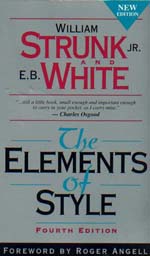Fifty years of The Elements of Style
 Strunk and White’s Elements of Style turns fifty today, according to a story on NPR’s Morning Edition. It’s just a slim youngster compared to our burly and venerable Chicago Manual of Style, but the little volume has influenced the prose of many an undergrad.
Strunk and White’s Elements of Style turns fifty today, according to a story on NPR’s Morning Edition. It’s just a slim youngster compared to our burly and venerable Chicago Manual of Style, but the little volume has influenced the prose of many an undergrad.
Is that something to celebrate? Writer and NPR guest Barbara Wallraff thinks so, giving approving notice to a “certain zen-like quality” about such famous maxims from the book as “eliminate needless words,” and “be clear.” But Geoffrey Pullum, professor of linguistics at the University of Edinburgh and a press author, begs to differ in an article today in the Chronicle of Higher Ed:
Some of the recommendations are vapid, like “Be clear” (how could one disagree?). Some are tautologous, like “Do not explain too much.” (Explaining too much means explaining more than you should, so of course you shouldn’t.) Many are useless, like “Omit needless words.” (The students who know which words are needless don’t need the instruction.)
And more regrettable in a grammar guide, Pullum argues,
the book’s toxic mix of purism, atavism, and personal eccentricity is not underpinned by a proper grounding in English grammar. It is often so misguided that the authors appear not to notice their own egregious flouting of its own rules. They can’t help it, because they don’t know how to identify what they condemn.
“Put statements in positive form,” they stipulate, in a section that seeks to prevent “not” from being used as “a means of evasion.”
“Write with nouns and verbs, not with adjectives and adverbs,” they insist. (The motivation of this mysterious decree remains unclear to me.)
And then, in the very next sentence, comes a negative passive clause containing three adjectives: “The adjective hasn’t been built that can pull a weak or inaccurate noun out of a tight place.”
That’s actually not just three strikes, it’s four, because in addition to contravening “positive form” and “active voice” and “nouns and verbs,” it has a relative clause (“that can pull”) removed from what it belongs with (the adjective), which violates another edict: “Keep related words together.”
The lesson to be drawn from this—other than never to invite a prescriptivist and a linguist to the same dinner party—is that fifty years is clearly too short a time to get limber in the ways of grammar and style. Chicago was pushing eighty before it achieved flexibility on the split infinitive.